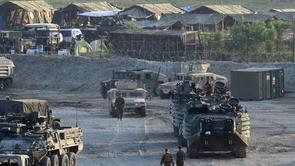 US marines walk next to their transport and amphibious vehicles at a temporary camp for the "Balikatan" joint US-Philippine military exercise at Crow Valley, in Capas town, north of Manila on April 14, 2016. (PHOTO / AFP)
US marines walk next to their transport and amphibious vehicles at a temporary camp for the "Balikatan" joint US-Philippine military exercise at Crow Valley, in Capas town, north of Manila on April 14, 2016. (PHOTO / AFP)
The Philippines must resist moves by the United States to militarize the region, analysts said, noting that the Southeast Asian nation should not be used in a “proxy war” instigated by Washington and its allies.
During a Feb 15 forum organized by the Manila-based think tank Asian Century Philippines Strategic Studies, or ACPh, experts criticized the Philippine government’s decision to give the US access to four new military sites. They said the move will reduce the Philippines to a “military asset” and threatens peace and stability in the Asia-Pacific region.
Anna Malindog-Uy, ACPh’s vice president for external affairs, said Washington’s militarization of Asia, which is being done at the expense of the Philippines, is meant to preserve “a unipolar world dominated by US” but is now being challenged by the rise of China and other regional powers
Anna Malindog-Uy, ACPh’s vice president for external affairs, said Washington’s militarization of Asia, which is being done at the expense of the Philippines, is meant to preserve “a unipolar world dominated by US” but is now being challenged by the rise of China and other regional powers.
She said the US aims to preserve its supremacy and exceptionalism, and is “afraid of the peaceful rise” of China and Asia as a whole. With China at the forefront of the rise of Asia, Washington is exerting all efforts to preserve its global hegemony at the expense of destroying Asia, Malindog-Uy said.
ALSO READ: Lending itself to US cause will be a curse for the Philippines
Expanding US access to Philippine military sites is part of the two countries’ Enhanced Defense Cooperation Agreement, or EDCA, which was signed in 2014. Malindog-Uy said that Filipinos must say no to the US government’s neocolonialism of the Philippines, to the full implementation of EDCA and to the enhanced US-Philippines joint patrol of the South China Sea which “is rattling peace and stability of Southeast Asia and the wider Asia-Pacific region”.
Former Philippine senator Anna Dominique Coseteng said the Philippine government should not be blinded by the US government’s pledge to allocate $82 million for infrastructure improvements under EDCA.
She reminded the audience of how the Philippine Senate voted against the Philippines-US Bases Treaty in 1991, forcing the US to shut down its military bases in the Philippines. Coseteng recalled that the US bases had brought huge social costs, including the rise of prostitution in areas surrounding the military bases, which were at that time located in the northern Philippine provinces of Olongapo and Pampanga.
ALSO READ: Washington moves stoke tensions, Beijing says
“Are we going to forget the tragedy, the travesty and the pain that was brought by Clark Air Base (in Pampanga) (and) the Subic Naval Base (in Olongapo) to our country and our people?,” Coseteng said.
“My question is, what is wrong with peace? Why is there so much disgust and hatred for peace?,” Coseteng said, noting that increased US military presence in the Philippines will make the country a “springboard to attack other countries” .
The Feb 15 forum, held in a hybrid format, came two days after Manila accused China of targeting a Philippine Coast Guard vessel on Feb 6 with a laser. A Chinese Foreign Ministry spokesman, Wang Wenbin, has said at a briefing that the vessel intruded into waters off the Ren’ai Reef without Chinese permission, and that the Chinese Coast Guard acted in a professional and restrained way. Wang said China and the Philippines are communicating about the matter through diplomatic channels.
On Feb 14, Chinese Ambassador to the Philippines Huang Xilian met with Philippine President Ferdinand Marcos Jr. They exchanged views on how to implement the consensus reached by the two heads of state, strengthen dialogue and communication, and properly manage maritime differences between the two countries.
READ MORE: Philippines grants US greater access to bases
Henry Chan, research fellow at the Manila-based think tank Integrated Development Studies Institute, said South China Sea dispute is a major issue among member countries of the Association of Southeast Asian Nations. Indonesia, this year’s ASEAN chairman, has said it is ready to host negotiations on the code of conduct in South China Sea. But Chan is not optimistic that such negotiations will be concluded soon.
“In geopolitics, we have a very famous phrase, ‘geography is destiny’. And whether we like it or not, having a good relationship with China is in the long-term permanent interest of the Philippines. You cannot change your neighbor,” Chan said.


